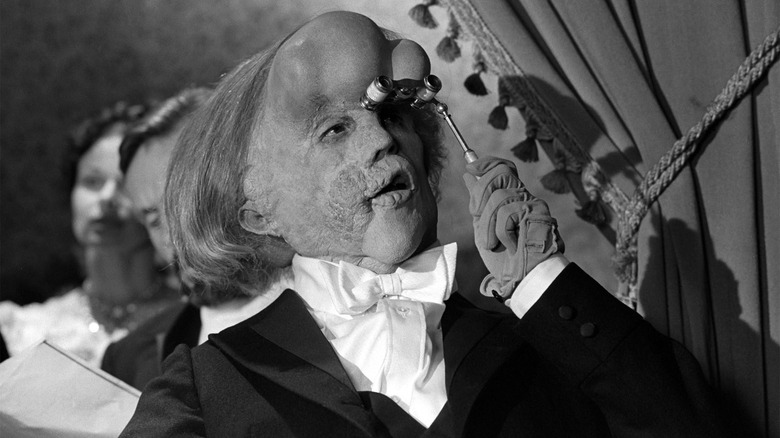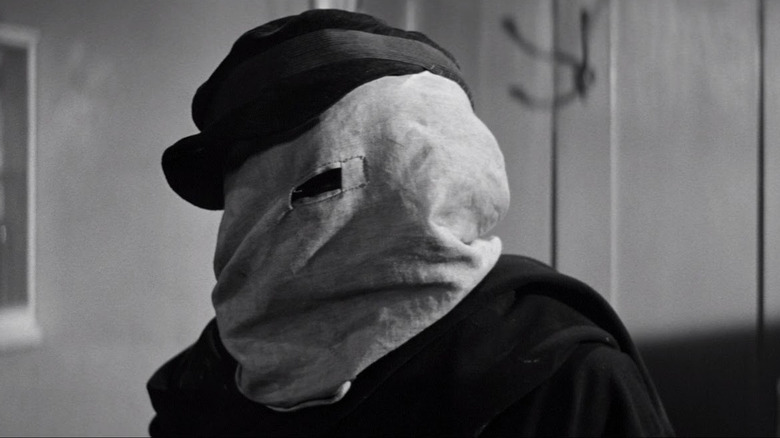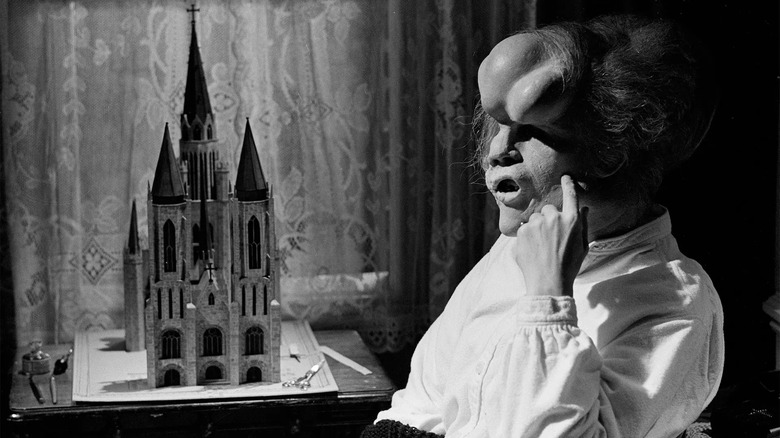
David Lynch's 1977 debut feature "Eraserhead" is a dank, horrifying picture, replete with surrealist imagery and themes of urban blight, suicidal ideation, and parental resentment. There are dreams within dreams, and even pleasant things are craggy and ugly. It's a smoky, messy film full of squirting bodily fluids and clumps of earth. It's one of the best films of its decade.
His 1980 follow-up film, "The Elephant Man," appears on paper to be one of the least likely sophomore efforts imaginable. Produced by Mel Brooks (yes, that Mel Brooks), "The Elephant Man" was a biographical prestige picture about the real-life Joseph Merrick (named John in the film), a man afflicted with, some have conjectured, Proteus syndrome. Merrick had an enlarged head, an outside right arm, and loose, tumor-ridden skin. He was a performer in circus sideshows and was assumed to be mentally infirm by his cruel "handlers." An English doctor named Frederick Treves discovered Merrick, hoping to study his condition, and, in so doing, found Merrick to be bright, gentle, and spiritual.
The role of John Merrick was, according to a 2020 retrospective in iNews, highly coveted by the Hollywood awards class. Multiple high-profile actors wanted the role that would eventually go to John Hurt (who, at the time, had most recently appeared in Ridley Scott's "Alien"). Indeed, one of Hollywood's hottest actors, Dustin Hoffman, who was already surrounded by awards buzz for "Kramer vs. Kramer," was initially on the shortlist.
Where Hoffman Ends

Hoffman, the retrospective points out, was interested in playing Merrick, and was able to connect with Brooks through a mutual lawyer. Another producer on "The Elephant Man," Jonathan Sanger, recalls rejecting the idea outright. Hoffman, Sanger felt, was far too big a movie star for a role that would require a good deal of makeup. Someone with an immediately recognizable face would make the makeup automatically look unrealistic. Sanger knew that audiences would not see John Merrick, but Dustin Hoffman in makeup. He said:
"Mel's lawyer said: 'I was talking to Dustin and he loves the idea of 'The Elephant Man.' I was immediately negative about it. I said to Mel: 'We're always going to be looking to see where the Elephant Man ends and Dustin Hoffman begins.'"
Meanwhile, Lynch wanted his friend Jack Nance to play the role. Nance has just spent five years making "Eraserhead" with Lynch — Nance played that film's main character, Henry Spencer — and the two had become quite close. During the casting process, however, Lynch saw the 1975 film version of "The Naked Civil Servant," the autobiography of queer icon Quentin Crisp. John Hurt played Crisp in that film, and Lynch immediately pivoted to courting him for the role.
Hurt, it turns out, wasn't immediately amenable.
'You Have To Be ****ing Joking'

It's not that Hurt had any sort of aversion to the story or the makeup appliances that he would have to wear. Hurt merely had an aversion to "Eraserhead." Because "Eraserhead" was so dark and unusual, Hurt felt put off. "Eraserhead," of course, was the reason Mel Brooks wanted to produce the filmmaker's next movie (you'll note that it was put out by "Brooksfilms," as to take Brooks' name off the production, making sure no one thought it was a comedy film). But Hurt didn't feel quite the same way.
Hurt recalls a conversation with a friend who was, shall we say, less than encouraging. He had to argue in its favor, knowing how striking "The Elephant Man" would look. In his words:
"I went with a friend, and she said: 'Well you won't be making that movie with David Lynch.' I said: 'You have to be f**king joking. I guarantee you will live to your dying day and you will not be short of thirty images out of that film.' It was so wild and dangerous."
"The Elephant Man" was nominated for eight Academy Awards, including Best Picture, Best Director, and Best Actor. It won zero. The Best Picture winner that year was Robert Redford's "Ordinary People." The film did, however, win Best Picture and Best Actor at the British Academy Awards, as well as the César Award for Best Foreign film. In 2022, it might be considered David Lynch's most emotionally touching film, all while still bearing the director's trademark aesthetic.
Read this next: Horror Roles That Changed Actors Forever
The post Dustin Hoffman Was Deemed Too Famous to Star in The Elephant Man appeared first on /Film.
0 Commentaires